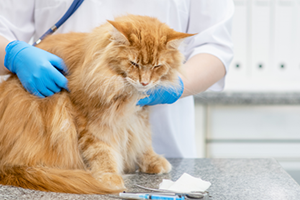7 ways to keep your cat happy
Quick Links
1. Tune in to what your cat says
It can be quite hard to understand what your cat is saying, but there are some sounds they make that you can easily recognise. If your cat is lying on your knee purring, it’s likely to be a sign of contentment. It’s also important to know that some cats purr when they’re in pain – for example, if they were in an accident – as it can potentially be a sign of self-soothing.
A happy cat will often meow or chirp to ask for something, or as a greeting. Growling or hissing, however, means that your cat feels frightened or threatened. An older cat that yowls, especially at night, may be suffering from hyperthyroidism, so have them checked out by your vet.
2. Watch for body language
If your cat is lying on their side with their tummy exposed, tail relaxed and eyes half-closed, that’s one happy cat. If they are walking towards you with their tail straight up, that’s friendly too, and often used as a greeting.
But watch out for one kind of tail wag. If you’re cuddling your cat and the tip of their tail starts twitching, they’re getting irritated. Stop stroking to avoid a swipe or nip.
Don’t forget about their ears and whiskers, too. Flat ears can signal fear. Whiskers that are flat against the face suggest that your cat might be unhappy and fearful.
3. ‘Read’ your cat’s coat and teeth
A healthy cat’s coat is shiny. The coat of a stressed cat probably won’t look the same and you might see more mats or dirt. This can be a sign they’re not grooming themselves or eating properly.
Fur loss or matting may indicate a physical problem.Arthritis, for example, can make grooming more difficult. Stress can also lead to overgrooming, so you may see bald patches. If your cat is drooling, has bad breath, shows discomfort when eating, or is eating on one side only, get a check-up for their teeth and gums.
4. Know the signs of stress
If your cat avoids you, or is skittish, keep a diary of their behaviour and what’s happening around them. Firstly, it’s important to get a vet check to rule out medical reasons, especially as many signs of stress are similar to signs of pain. If your cat gets a clean bill of health, the problem may be caused by something temporary, such as havingguests to stay, and this type of stress should resolve itself. In the meantime, here are some ways to help your cat feel more secure:
- Create a safe, quiet spot for your cat to retreat to, with a bed, water bowl and some cat treats.
- Keep your cat’s litter tray well away from the areas they eat and sleep in.
- Let your cat out so they can find a comfy spot in the garden to get away from whatever they find stressful.
- If your cat is spraying urine or ‘middening’ (pooing in a prominent place), these are signs of an unhappy cat marking their territory to help them feel secure. Place scratching posts around the house to give your cat another way of putting down scent markings.
- Use a plug-in pheromone diffuser to help your cat feel calmer.
If you’re consistently noticing signs of stress, your vet can refer you to a qualified animal behaviourist (such as a member of the Animal Behaviour & Training Council) for advice on other helpful changes you can make to your home.
5. Learn your cat’s eating habits
Eating little and often is what most cats prefer, so be aware of your cat’s normal feeding patterns. If this changes, it could be a sign of anxiety or illness, so check with your vet.
Encourage happy mealtimes by placing your cat’s food and water bowl apart from each other in a quiet place, and well away from their litter tray. If you have multiple cats, make sure there are more bowls of food and water than cats, so they never have to fight over resources.
6. Keep your cat entertained
A bored cat is an unhappy cat. As hunters, cats love the thrill of the chase, so give your cat, particularly indoor cats, an outlet for that behaviour. If they start attacking your ankles, they may not be getting enough predatory play. Alternatively, they could be suffering from a medical problem, requiring the attention of a vet.
Most cats enjoy playing with fishing-rod toys or chasing ping-pong balls. Food activity toys are a great way to mentally stimulate your cat and appeal to their hunting instincts at the same time.
A simple idea is to put some dry food into an empty cardboard egg box, and show your cat how to use it by ‘pawing’ out the biscuits with your fingers for a few minutes. Then let your cat have a go.
7. Monitor sleep patterns
Cats love their sleep and spend about 16 hours napping each day. You need to know what’s normal for your cat, so pay attention to their sleep patterns. Younger, more active cats tend to sleep more deeply, while older cats tend to have more naps.
Excessive sleeping could be a sign of pain, so if your cat’s sleep pattern changes, check it out with your vet.
Petplan is a trading name of Pet Plan Limited (Registered in England No. 1282939) and Allianz Insurance plc (Registered in England No. 84638), Registered office: 57 Ladymead, Guildford, Surrey GU1 1DB.
Pet Plan Limited is authorised and regulated by the Financial Conduct Authority. Financial Services Register No. 311969. Allianz Insurance plc is authorised by the Prudential Regulation Authority and regulated by the Financial Conduct Authority and the Prudential Regulation Authority. Financial Services Register No. 121849. Pet Plan Limited is a subsidiary of Allianz Insurance plc.












